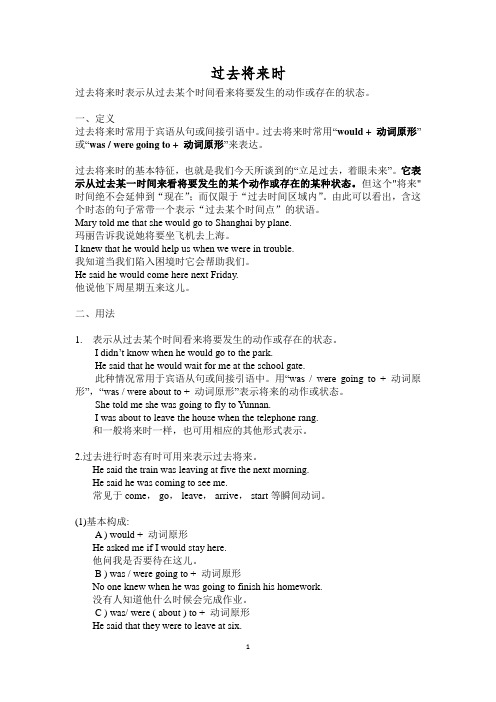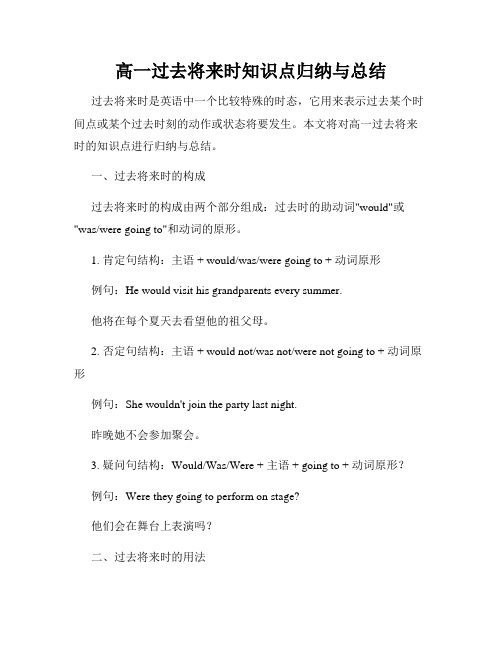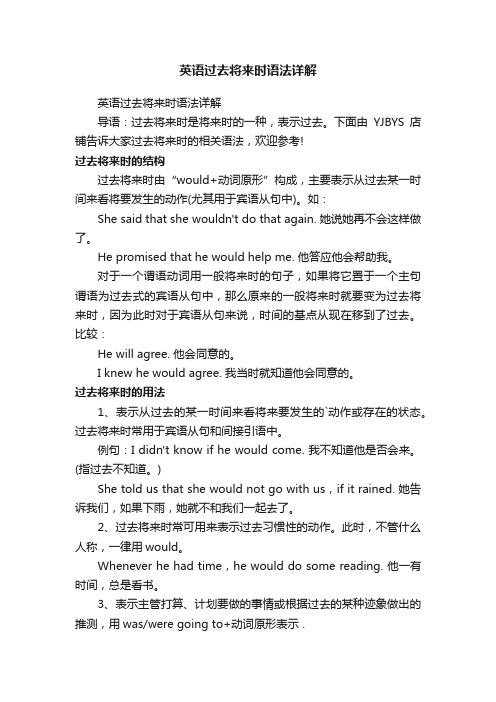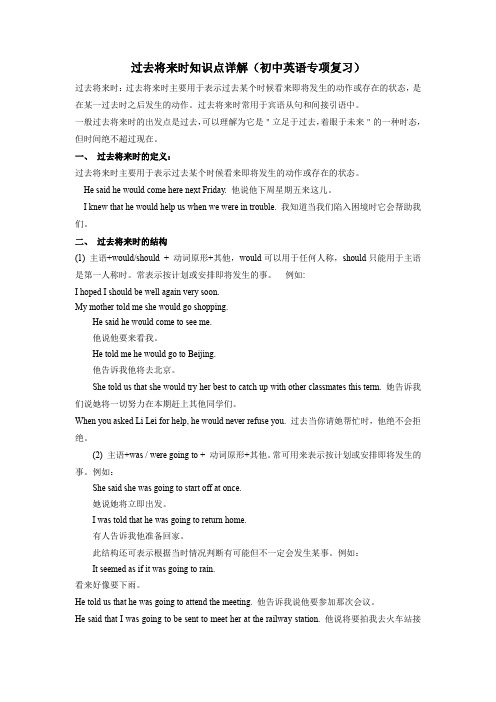过去将来时讲解
过去将来时讲解

过去将来时过去将来时表示从过去某个时间看来将要发生的动作或存在的状态。
一、定义过去将来时常用于宾语从句或间接引语中。
过去将来时常用“would + 动词原形”或“was / were going to + 动词原形”来表达。
过去将来时的基本特征,也就是我们今天所谈到的“立足过去,着眼未来”。
它表示从过去某一时间来看将要发生的某个动作或存在的某种状态。
但这个"将来"时间绝不会延伸到“现在”;而仅限于“过去时间区域内”。
由此可以看出,含这个时态的句子常带一个表示“过去某个时间点”的状语。
Mary told me that she would go to Shanghai by plane.玛丽告诉我说她将要坐飞机去上海。
I knew that he would help us when we were in trouble.我知道当我们陷入困境时它会帮助我们。
He said he would come here next Friday.他说他下周星期五来这儿。
二、用法1.表示从过去某个时间看来将要发生的动作或存在的状态。
I didn’t know when he would go to the park.He said that he would wait for me at the school gate.此种情况常用于宾语从句或间接引语中。
用“was / were going to + 动词原形”,“was / were about to + 动词原形”表示将来的动作或状态。
She told me she was going to fly to Yunnan.I was about to leave the house when the telephone rang.和一般将来时一样,也可用相应的其他形式表示。
2.过去进行时态有时可用来表示过去将来。
He said the train was leaving at five the next morning.He said he was coming to see me.常见于come, go, leave, arrive, start等瞬间动词。
英语语法过去将来时的讲解

英语语法过去将来时的讲解英语语法过去将来时的讲解一、过去将来时的'含义过去将来时表示在过去某个时间看来将要发生的动作或存在的状态。
过去将来时常用于宾语从句和间接引语中。
例如:I didnt know if he would come.我不知道他是否会来。
They never knew that population would become a big problem.他们从来都不知道人口问题将会成为一个大问题。
She didnt tell me where she would go.她没有告诉我她要去哪儿。
Betty said she would visit the Great Wall next Saturday.贝蒂说下周六她要去参观长城。
二、过去将来时的表达法(一)would+动词原形。
常表示按计划或安排即将发生的事。
例如He said he would come to see me.他说他要来看我。
He told me he would go to Beijing.他告诉我他将去北京。
(二)was/ were+going to+动词原形。
常可用来表示按计划或安排即将发生的事。
例如:She said she was going to start off at once.她说她将立即出发。
I was told that he was going to return home.有人告诉我他准备回家。
此结构还可表示根据当时情况判断有可能但不一定会发生某事。
例如:It seemed as if it was going to rain.看来好像要下雨。
(三)come,go,leave,arrive,start等动词可用过去进行时代替过去将来时。
例如:He said the train was leaving at six the next morning.他说火车将于第二天早晨六点离开。
高一过去将来时知识点归纳与总结

高一过去将来时知识点归纳与总结过去将来时是英语中一个比较特殊的时态,它用来表示过去某个时间点或某个过去时刻的动作或状态将要发生。
本文将对高一过去将来时的知识点进行归纳与总结。
一、过去将来时的构成过去将来时的构成由两个部分组成:过去时的助动词"would"或"was/were going to"和动词的原形。
1. 肯定句结构:主语 + would/was/were going to + 动词原形例句:He would visit his grandparents every summer.他将在每个夏天去看望他的祖父母。
2. 否定句结构:主语 + would not/was not/were not going to + 动词原形例句:She wouldn't join the party last night.昨晚她不会参加聚会。
3. 疑问句结构:Would/Was/Were + 主语 + going to + 动词原形?例句:Were they going to perform on stage?他们会在舞台上表演吗?二、过去将来时的用法1. 表示过去某个时刻已经计划或打算做的事情。
例句:She told me she would meet me at the train station.她告诉我她会在火车站和我见面。
2. 表示过去对未来可能发生的事情的预测、推测或假设。
例句:I thought it would rain, so I brought an umbrella.我以为会下雨,所以带了把伞。
3. 用于叙述历史事件中人们过去对未来的描述。
例句:They believed that humans would land on the moon one day.他们相信人类终有一天会登上月球。
4. 表示过去类似于"将来完成时"的动作或状态。
过去将来时知识点归纳与总结

过去将来时知识点归纳与总结过去将来时是英语中的一种时态,用于表示过去某一时间点或某一事件之后将要发生的动作或状态。
本文将对过去将来时的知识点进行归纳与总结。
一、过去将来时的构成过去将来时由助动词"would"加动词原形构成,也可以使用"was/were going to"或"was/were + 动词+ing"来表示。
例如:"I would visit my grandmother tomorrow."(我明天将要去看望我的祖母。
)二、过去将来时的用法1. 表示过去某一时间点之后将要发生的动作或状态。
例如:"He said he would call me later."(他说他过会儿会给我打电话。
)2. 表示过去的推测或猜测。
例如:"I thought she would be angry, but she wasn't."(我以为她会生气,但她并没有。
)3. 表示过去的习惯或经常性动作。
例如:"When I was young, I would often go swimming in the river."(小时候,我经常去河里游泳。
)三、过去将来时的时间状语过去将来时常常与一些特定的时间状语连用,如"tomorrow"(明天)、"next week"(下周)、"in the future"(在将来)等等。
这些时间状语可以帮助我们更准确地理解句子的意思。
四、过去将来时与其他时态的区别过去将来时与其他时态的区别主要在于时间上的不同。
过去将来时表示过去某一时间点之后将要发生的动作或状态,而其他时态则表示不同的时间关系。
例如,现在完成时表示过去发生的某个动作对现在产生的影响,而将来进行时表示将来某一时间点正在进行的动作。
英语过去将来时语法详解

英语过去将来时语法详解英语过去将来时语法详解导语:过去将来时是将来时的一种,表示过去。
下面由YJBYS店铺告诉大家过去将来时的相关语法,欢迎参考!过去将来时的结构过去将来时由“would+动词原形”构成,主要表示从过去某一时间来看将要发生的动作(尤其用于宾语从句中)。
如:She said that she wouldn't do that again. 她说她再不会这样做了。
He promised that he would help me. 他答应他会帮助我。
对于一个谓语动词用一般将来时的句子,如果将它置于一个主句谓语为过去式的宾语从句中,那么原来的一般将来时就要变为过去将来时,因为此时对于宾语从句来说,时间的基点从现在移到了过去。
比较:He will agree. 他会同意的。
I knew he would agree. 我当时就知道他会同意的。
过去将来时的用法1、表示从过去的某一时间来看将来要发生的`动作或存在的状态。
过去将来时常用于宾语从句和间接引语中。
例句:I didn't know if he would come. 我不知道他是否会来。
(指过去不知道。
)She told us that she would not go with us,if it rained. 她告诉我们,如果下雨,她就不和我们一起去了。
2、过去将来时常可用来表示过去习惯性的动作。
此时,不管什么人称,一律用would。
Whenever he had time,he would do some reading. 他一有时间,总是看书。
3、表示主管打算、计划要做的事情或根据过去的某种迹象做出的推测,用was/were going to+动词原形表示 .例句:Last Sunday we were going to visit the Great Wall, but it rained. 上星期天我们本想去游览长城的,但却下雨了。
高中英语2025届高考语法复习过去将来时知识讲解(共三方面)

高考英语语法复习过去将来时知识讲解一、定义及用法过去将来时,作为英语语法中一个重要的时态,主要用于描述在过去某一时刻看来将要发生的动作或状态。
它不仅可以回顾过去,还蕴含了对未来的展望。
(一)过去将来时的定义过去将来时,顾名思义,是指在过去某个时间点看来将要发生的动作或状态。
它并不是直接描述过去或现在的事实,而是基于过去的视角,对未来的一种预测、计划或期望。
这种时态在英语等语言中有着广泛的应用,通常通过特定的动词形式来体现,如“would do”、“was/were going to do”等。
过去将来时让语言的叙述层次更加分明,能够生动地重构过去的思考和预期。
(二)过去将来时的用法1.用“would+动词原形”表示过去将来这是过去将来时最直接的表达方式之一,其中“would”作为助动词,与动词原形一起构成谓语,表示从过去某个时间点看将要发生的动作或状态。
例句:He said he would come to see me the next day.他说他第二天会来看我。
She hoped that they would meet again someday.她希望将来有一天他们能再见面。
2.用“was/were going to+动词原形”表示按计划或安排即将发生的事这种方式常用于描述过去某个时间点已经安排好或计划好的未来动作,强调计划性或意图性。
例句:She told me she was going to start a new job next month.她告诉我她下个月将开始一份新工作。
They were going to have a picnic on Sunday,but it rained.他们原计划在周日去野餐,但下雨了。
3.用“was/were to+动词原形”表示过去计划或安排中的未来动作这种结构也常用于表示按计划或安排即将发生的事,但相较于“was/were going to”,它更强调一种规定性、义务性或命令性的未来动作。
过去将来时知识点详解(初中英语专项复习) (11)

过去将来时知识点详解(初中英语专项复习)过去将来时:过去将来时主要用于表示过去某个时候看来即将发生的动作或存在的状态,是在某一过去时之后发生的动作。
过去将来时常用于宾语从句和间接引语中。
一般过去将来时的出发点是过去,可以理解为它是"立足于过去,着眼于未来"的一种时态,但时间绝不超过现在。
一、过去将来时的定义:过去将来时主要用于表示过去某个时候看来即将发生的动作或存在的状态。
He said he would come here next Friday. 他说他下周星期五来这儿。
I knew that he would help us when we were in trouble. 我知道当我们陷入困境时它会帮助我们。
二、过去将来时的结构(1) 主语+would/should + 动词原形+其他,would可以用于任何人称,should只能用于主语是第一人称时。
常表示按计划或安排即将发生的事。
例如:I hoped I should be well again very soon.My mother told me she would go shopping.He said he would come to see me.他说他要来看我。
He told me he would go to Beijing.他告诉我他将去北京。
She told us that she would try her best to catch up with other classmates this term. 她告诉我们说她将一切努力在本期赶上其他同学们。
When you asked Li Lei for help, he would never refuse you. 过去当你请她帮忙时,他绝不会拒绝。
(2) 主语+was / were going to + 动词原形+其他。
常可用来表示按计划或安排即将发生的事。
例如:She said she was going to start off at once.她说她将立即出发。
过去将来时分析和总结

过去将来时过去将来时:表示从过去的某一时间来看将来要发生的动作戒存在的状态。
过去将来时常用于宾语从句和间接引语中。
去将来时的出发点是过去,即从过去某一时刻看以后要发生的动作戒状态。
过去将来时表达法:1.would+动词原形例如:When you asked Li Lei for help, he would never refuse you.2.was/were going to+动词原形例如:He told ustaht he was going to attend the meeting.3.was/were lo+动词原形例如:Li Lei was to arrive soon. 4. was/were about to+动词原形例如:We were about to leave there when it began to rain heavily and suddenly.5. was/wcrc+现在分词例如:He was leaving the next day.句型结构:肯定句:主语+be, was, were, going to+动词原形〜.否认句:主语+bc, was, were, not going to+动词原形〜.疑问句:Be, Was, Were, +主语+going to+动词原形〜?肯定句:主语+would, should, +动词原形~.否认句:主语+would, should, not+动词原形~.疑问句:Would, Should, +主语+动词原形〜?过去将来时的构成和一般将来时一样,只不过把助动词be变为过去式,把will, shall 变为过去式。
例句:I didn''t know if he would come. =1 dicin'' t know if he was going to come.我不知道他是否会来。
过去将来时具体用法:一、would+不定式1.用“would+不定式”表示过去将来时间通常带有表示过去将来的时间状语,而且多见于附属分句。
- 1、下载文档前请自行甄别文档内容的完整性,平台不提供额外的编辑、内容补充、找答案等附加服务。
- 2、"仅部分预览"的文档,不可在线预览部分如存在完整性等问题,可反馈申请退款(可完整预览的文档不适用该条件!)。
- 3、如文档侵犯您的权益,请联系客服反馈,我们会尽快为您处理(人工客服工作时间:9:00-18:30)。
过去将来时态
定义:
过去将来时的基本特征,即“立足过去,着眼未来”。
它表示从过去某一时间来看将要发生的某个动作或存在的某种状态。
但这个"将来"时间绝不会延伸到“现在”;而仅限于“过去时间区域内”。
由此可以看出,含这个时态的句子常带一个表示“过去某个时间点”的状语例如:Mary told me that she would go to Shanghai by plane.玛丽告诉我说她将要坐飞机去上海。
He said he would come here next Friday. 他说他下周星期五来这儿。
I knew that he would help us when we were in trouble.
我知道当我们陷入困境时它会帮助我们。
基本构成
A ) would + 动词原形
如:He asked me if I would stay here. 他问我是否要待在这儿。
She told us that she would try her best to catch up with other classmates this term. 她告诉我们说她将一切努力在本期赶上其他同学们。
When you asked Li Lei for help, he would never refuse you. 过去当你请她帮忙时,他绝不会拒绝。
B ) was / were going to + 动词原形
如:No one knew when he was going to finish his homework.
没有人知道他什么时候会完成作业。
He told us that he was going to attend the meeting. 他告诉我说他要参加那次会议。
He said that I was going to be sent to meet her at the railway station. 他说将要拍我去火车站接她
C ) was/ were about to + 动词原形
如:He said that they were to leave at six. 他说他们将于6点动身。
She said that the meeting was about to begin. 她说会议就要开始了
We were about to leave there when it began to rain heavily and suddenly.
就在我们要离开时,天突然下起了大雨。
He was about to have lunch when the bell rang. 就在他要吃中饭的时候,门铃响起来了。
D) was / were to + 动词原形。
如:
The building was to be completed next month. 这座建筑改在下个月竣工。
Li Lei was to arrive soon. 李蕾很快就要到了。
E) come, go, arrive, leave, die 等瞬时动词,用在过去进行时态中表示过去将来。
was / were +现在分词。
如:
He was leaving the next day. 他第二天要走了。
We were informed that the leaders were coming to our school soon.
我们接到通知说领导们很快要来我们学校。
She told us that she was leaving for Yunnan. 她告诉我们她将要去云南。
基本用法
A ) 主句为过去时,宾语从句常表示将要发生的事情。
如:Nobody knew what would happen after a hundred years.
没有人知道一百年之后将会发生什么事。
We wanted to know whether she was going to speak at the meeting.
我们想知道她是否准备在会上发言。
He said he would stay with us. 他说他要与我们呆在一起。
He said he would never go there again. 他说他绝不会再去那儿。
He didn't expect that we would all be there. 他没料到我们会全在那儿。
B)表示过去习惯性的动作
During that period , he would do morning-exercises every day. 在那段时间,他每天早锻炼。
Whenever he had time, he would help his mother with some housework.
无论他什么时间有空,他总是帮他妈妈干点家务活。
C) 表示过去情况中的“愿望”、“倾向”,多用于否定句。
例如:
No matter how difficult the work was , he would keep on doing it until he accomplished it . 不管工作有多难,他总会坚持不懈地把它干完。
They knew that we would never permit such a thing. 他们知道我们绝不会允许发生这样的事。
Even after the lecture ended, the audience would not leave . 甚至在讲座结束之后,听众仍不肯离去。
D) 过去将来时,用于虚拟语气中,如:
If I were you, I would not do that. 要是我是你的话,我就不会那样做。
If he were here, he would show us how to do it. 如果他在这儿,他就会向我们展示该如何做了If I had a chance to study abroad, I would study at Harvard University.如果我有机会出国学习的话,我就会去哈佛大学。
I wish he would go with me to the cinema tonight.
今晚他能和我一起去看电影就好了。
用所给动词的适当形式填空
1. Miss Zhang said she ________(visit) the Great Wall next summer.
2. She told him that she ________(not stay) here for long.
3. I wasn’t sure whether Lucy_______(come) the next year.
4. The scientists said the world’s population _______ (slow) down in future.
5. She said the bus _______(leave) at five the next morning.
6. I wasn't sure whether he _______(lend) me his book the next morning.
7. He was fifty-six. In two years he _______(be) fifty-eight.
8. Whenever she has time, she ______(help) them in their work.
1. would visit
2. would not stay
3. would come
4. would slow
5. was leaving
6. would lend
7. would be
8. would help。
